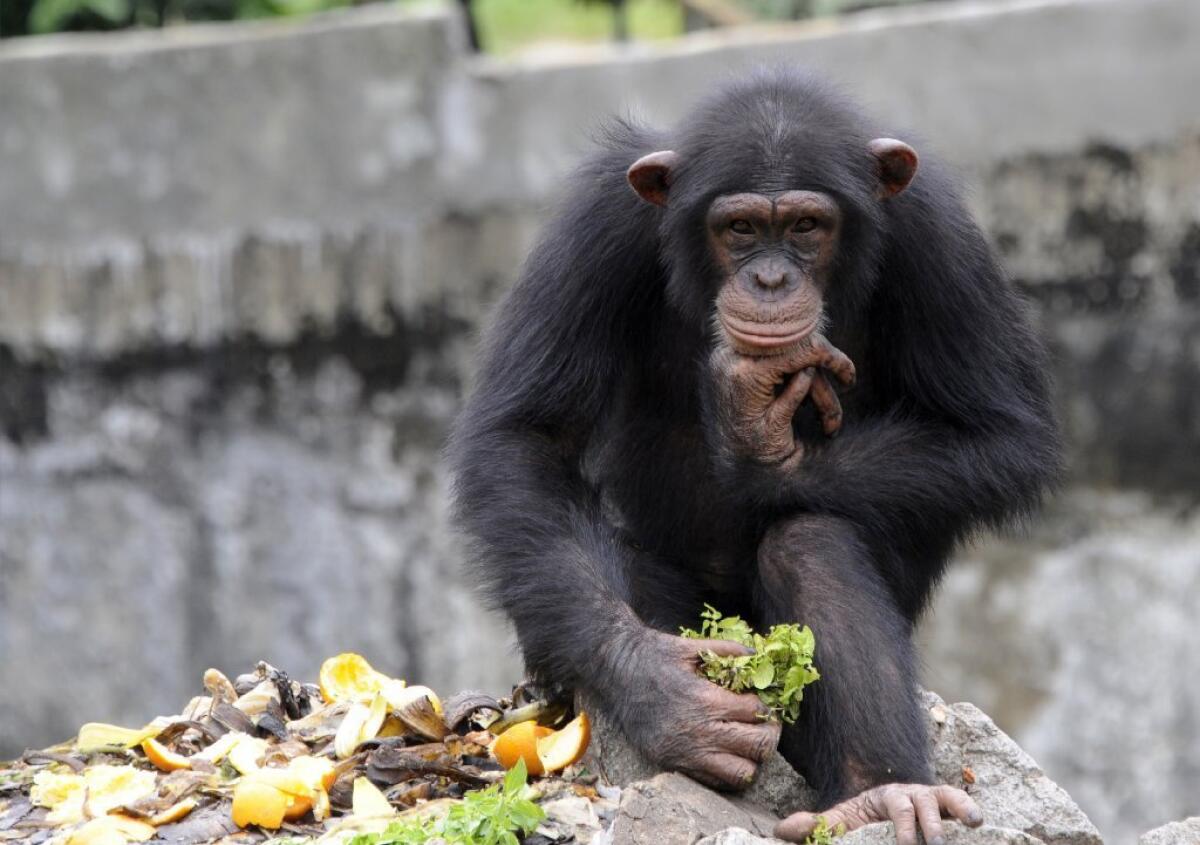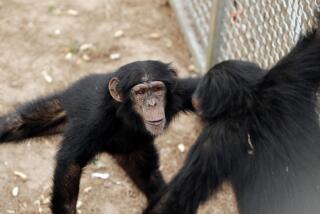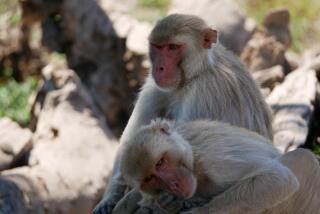Chimps dig palm wine, new study finds

A chimpanzee holds lettuce at the zoo in Abidjan, Ivory Coast on June 12, 2014. New research on wild chimpanzees in Guinea shows that the apes can regularly consume alcohol.
- Share via
Chimpanzees seem to enjoy a drink as much as their human relatives. A new study tracking the drinking habits of wild chimps in West Africa have found that they regularly steal a little of the alcoholic beverages made by locals.
The findings, published in the Royal Society Open Interface, may shed light on the shared evolutionary roots behind the human body’s ability to metabolize ethanol.
“Ethanol consumption occurs in every modern human society that has access to fermentable raw materials,” they wrote. “Hence, it has been suggested that ethanol ingestion provided an adaptive benefit to human ancestors, and by extension, perhaps also other apes.”
Here’s the problem though: Alcohol consumption among most primates seems to be pretty rare, and accidental when it does occur. Tree-dwelling primates usually don’t eat fruit that has fallen to the ground, sticking to the fresher fare still attached to branches.
But as the ancestors of humans evolved toward a ground-dwelling lifestyle, perhaps the fruit on the ground – whether fresh or fermenting – was an easier option. Some theories also point to possible advantages of consuming alcohol.
“The ‘drunken monkey hypothesis’ states that natural selection favoured those primates with an attraction to ethanol (commonly referred to as alcohol) because it was associated with proximate benefits (e.g. acting as an appetite stimulant or a cue to finding fruit, or as an unavoidable consequence of a frugivorous diet, etc.), consequently increasing caloric gains,” the study authors wrote in a paper led by Kimberley Hockings of Oxford Brookes University in England.
But there isn’t a whole lot of scientific evidence to prove or disprove these ideas, the scientists say, There are a number of anecdotes of wild primates consuming ethanol, but not a lot of validated ones.
So in an effort to track whether primates really do seek out alcohol, an international team of researchers watched the drinking patterns of chimpanzees in Bossou, Guinea. The residents there make a fermented drink from the sap of raffia palms by tapping the palm tree, letting the sap drip into containers, where the sugary liquid quickly ferments. The harvester comes back several hours later to collect the container, and the palm wine is consumed pretty quickly.
It turns out that in those unguarded hours, the chimpanzees like to enjoy a drink or two on the house. Over 17 years, the scientists saw 51 instances of chimps drinking the palm sap collected in these plastic containers. The apes would fold or crumple leaves, dip them into the containers and then insert them in their mouths.
And in case you were wondering, the apes did occasionally get tipsy, the scientists said.
“Some of the chimpanzees at Bossou consumed significant quantities of ethanol and displayed behavioural signs of inebriation,” they wrote. “Researchers rarely collected detailed behavioural data before versus after exposure to ethanol, but some drinkers rested directly after imbibing fermented sap.”
Not all of members of this particular community of chimps appeared to partake; there were 13 “regulars,” while 13 others were never seen drinking the sap. Some were heavier drinkers than others; one male accounted for 14 of the 51 events. Some might be called more social drinkers – they were happy to cluster around a container with a group, each dipping their leaf in turn. Others preferred to drink alone, keeping the container to themselves.
“These data show that ethanol does not act as a deterrent to feeding in this community of wild apes,” the authors wrote, “supporting the idea that the last common ancestor of living African apes and modern humans was not averse to ingesting foods containing ethanol.”
So chimps appear to be repeat customers – but does it mean they actually are drinking it for the alcohol? Palm sap is rich in vitamins and minerals, and the drink’s massive amounts of sugar might be able to mitigate the taste of alcohol (just as an overly sweet margarita can mask the amount of tequila within).
The only way to know whether chimps are going for the alcohol? Give them a choice between virgin and “dirty” drinks.
“An experimental trial to provide chimpanzees with access to fermenting and non-fermenting palm sap is needed to test if gustation is a straightforward proximate explanation for the fermented palm sap ingestion (i.e. whether ethanol is an attractant),” they wrote.
Follow @aminawrite for more wild science news from the animal kingdom.







